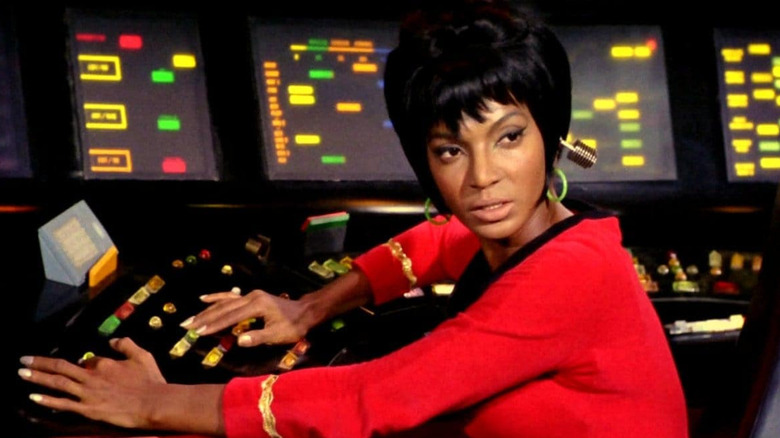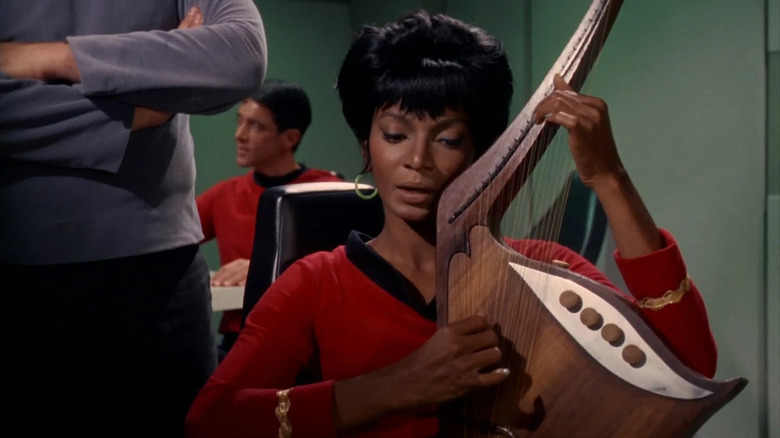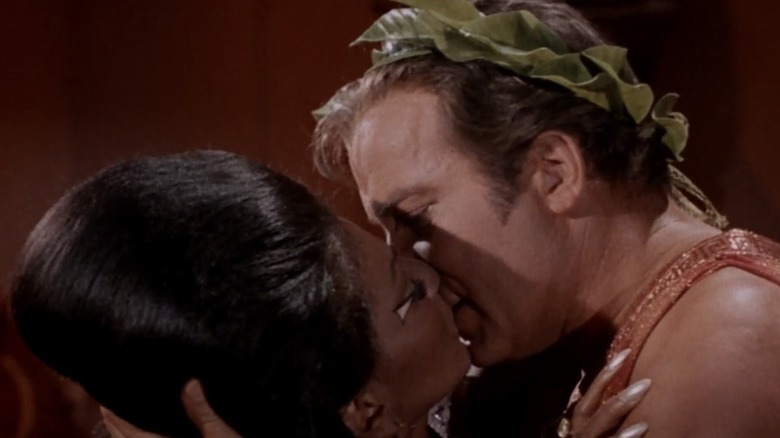Nichelle Nichols' Biggest Fan, Martin Luther King Jr., Convinced Her Not To Quit Star Trek
Another day, another acting legend gone. Nichelle Nichols, a trailblazer if there ever was one, passed away on July 30, 2022. Nichols' role as Lt. Nyota Uhura on "Star Trek" was one of the first times a Black woman was portrayed in a competent, authoritative role on US television, and Nichols herself was the first African-American actress to have a lead role on a TV show. "Star Trek" creator Gene Roddenberry wanted to show a future of racial harmony, and Nichols' role in the series was integral to selling that vision.
However, Nichols almost left the series after its first season in order to pursue another job. Fate had other plans for Nichols, though, and so granted her a fateful encounter with Martin Luther King Jr., who convinced her to stay.
Nichols told the story in full to NPR in 2011. The reason she considered leaving "Trek" was that she wanted her career to take a different direction — onto Broadway. She had "grown up" with musicals and saw herself as a singer and dancer as much as an actor. The "Star Trek" episode "Charlie X" features Uhura singing while Spock plays a Vulcan harp, but it goes without saying that music wasn't a big part of the job.
Nichelle's biggest fan
As the show took off, Nichols was now famous and decided it was time for her to give Broadway a shot. When she told Gene Roddenberry, he sullenly asked her to take a weekend to reconsider. Nichols obliged him, and that weekend she met King at an NAACP fundraiser. As Nichols later recalled, she was told that her "biggest fan" was in attendance and was desperate to meet her.
She turned around, and saw King approaching. "I remember thinking, 'whoever the fan is, is going to have to wait,'" said Nichols. "Because Dr. King — Dr. Martin Luther King, my leader! — is walking toward me!'" As it turned out, the enthusiastic "Star Trek" fan and the civil rights leader were one and the same person. Nichols told NPR:
"He complimented me on the manner in which I'd created the character. I thanked him, and I think I said something like, 'Dr. King, I wish I could be out there marching with you.' He said, 'no, no, no. No, you don't understand ... You are marching. You are reflecting what we are fighting for.'
"I said, 'Well, I told Gene just yesterday that I'm going to leave the show after the first year because I've been offered...' — and he stopped me and said: 'You cannot do that.' And I was stunned. He said, 'Don't you understand what this man has achieved? For the first time, we are being seen the world over as we should be seen.' He says, 'Do you understand that this is the only show that my wife Coretta and I will allow our little children to stay up and watch?' I was speechless.'"
Needless to say, King's words convinced Nichols to keep playing Uhura.
Uhura's continuing impact
It makes sense that King was a "Star Trek" fan, since the series was ideologically aligned with his own mission. For starters, there was the diversity of the Enterprise crew, from Uhura to the East-Asian Lt. Sulu (George Takei) and the Russian-Jewish Ensign Chekov (Walter Koenig). Second, the series was unafraid to tackle racism: "Let That Be Your Last Battlefield" features a race of aliens bent on destroying each other because one group has black skin on their right half, white on the left while the other group has it the other way around. Blunt by modern standards, but in the 1960s mainstream, it's as good as you were going to get. Third, "Star Trek" depicts a future where personal betterment is what guides humanity, not material accumulation. It's overshadowed by his civil rights work, but King advocated for wealth redistribution as well.
By convincing Nichols to stay, King also paved the way for a watershed moment. The "Star Trek" season 3 episode "Plato's Stepchildren" features a kiss between Uhura and Captain Kirk (William Shatner). This was one of the first interracial kisses on TV; the episode aired just one year after the Supreme Court struck down anti-miscegenation laws in "Loving V. Virginia." That iconic "Star Trek" moment wouldn't have happened if Nichols had left the show.
On a smaller scale, Nichols' role as Uhura inspired future Black "Star Trek" actors like Whoopi Goldberg, LeVar Burton, and Tim Russ to carry on her TV legacy. The role of Uhura herself has passed on to Zoe Saldaña and Celia Rose Gooding; in the words of Goldberg, "It's all Nichelle Nichols' fault!"


